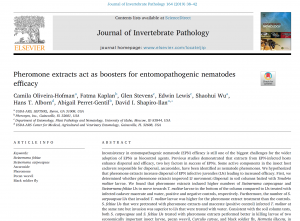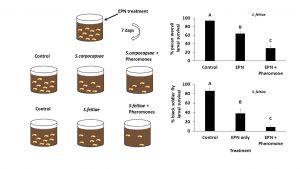Peer-reviewed Study Supports Pheronym’s Approach to Nematode Bio-remediation as Economical and Effective for Commercial Deployment
 DAVIS, CA – May 14, 2019 – Pheronym, an ag-biotech pest control company, announced today the results of a study supporting the commercial efficacy of their breakthrough bio-remediation technology. In tests, commercially available beneficial nematodes exposed to their patented Nemastim™ pheromone extracts were 28% – 78% more effective controlling pecan weevils and black soldier flies than non-exposed nematodes. The research, led by Dr. David Shapiro-Ilan, an entomologist with the USDA-Agricultural Research Service, along with ARS research associate Dr. Oliveira-Hofman, and co-authored by Dr. Ed Lewis, head of the Department of Entomology, Plant Pathology and Nematology at the University of Idaho, is currently featured in “The Journal of Invertebrate Pathology, Volume 164” and can be accessed through “Science Direct” at https://doi.org/10.1016/j.jip.2019.04.008.
DAVIS, CA – May 14, 2019 – Pheronym, an ag-biotech pest control company, announced today the results of a study supporting the commercial efficacy of their breakthrough bio-remediation technology. In tests, commercially available beneficial nematodes exposed to their patented Nemastim™ pheromone extracts were 28% – 78% more effective controlling pecan weevils and black soldier flies than non-exposed nematodes. The research, led by Dr. David Shapiro-Ilan, an entomologist with the USDA-Agricultural Research Service, along with ARS research associate Dr. Oliveira-Hofman, and co-authored by Dr. Ed Lewis, head of the Department of Entomology, Plant Pathology and Nematology at the University of Idaho, is currently featured in “The Journal of Invertebrate Pathology, Volume 164” and can be accessed through “Science Direct” at https://doi.org/10.1016/j.jip.2019.04.008.
“In biological control approaches, it is usually the prey’s natural pheromone that is used to lure the predators or parasitoids to kill the pest. To our knowledge, this is the first time a predator’s or parasite’s own pheromone was used to improve its effectiveness in attacking its prey,” said Dr. Shapiro-Ilan.
“Not only was this approach extremely effective in boosting nematodes’ ability to control pests, the use of pheromones as created by Pheronym promises to be economically feasible, as only a small amount of concentrated pheromone extract solution activates the nematodes,” added Dr. Lewis.
 “The next step is to begin commercial production,” said Dr. Fatma Kaplan, CEO of Pheronym. “The benefits of this approach including enhanced efficacy, reduced costs and increased sustainability, are exactly the things that our agricultural customers are asking for and consumers of produce are demanding.”
“The next step is to begin commercial production,” said Dr. Fatma Kaplan, CEO of Pheronym. “The benefits of this approach including enhanced efficacy, reduced costs and increased sustainability, are exactly the things that our agricultural customers are asking for and consumers of produce are demanding.”
The publishing of this study caps off a year of milestones for Pheronym, having secured more than $1 million in grants from agencies, including the USDA-National Institute of Food and Agriculture’s Small Business Innovation Research (SBIR) Phase I and Agriculture and Food Research Initiative (AFRI) programs, and being selected to conduct the first ever agriculture bio-control experiment in space, in collaboration with USDA, aboard the International Space Station National Laboratory with a launch date scheduled for Dec. 4, 2019.

